217 What is Responsible Breeder
WHAT IS A RESPONSIBLE BREEDER?
by David Hancock
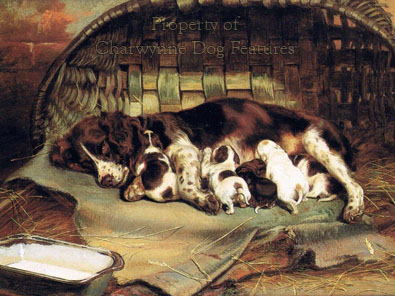 "Try to buy direct from the breeder...If buying a pedigree dog always go to a specialist breeder, not a dealer". Those words from "The Canine Code", published by the Kennel Club, are the customary advice given in such a publication and in books written by those who breed pedigree dogs. There can of course be some merit in this advice. Quite a number of show breeders are however dealers too (the Canine Code defines a dealer as someone who usually advertises several breeds of dog). Without a breeders' register, denoting acknowledged quality, it is unwise I believe to make an automatic assumption that all show breeders are honourable, responsible people.
"Try to buy direct from the breeder...If buying a pedigree dog always go to a specialist breeder, not a dealer". Those words from "The Canine Code", published by the Kennel Club, are the customary advice given in such a publication and in books written by those who breed pedigree dogs. There can of course be some merit in this advice. Quite a number of show breeders are however dealers too (the Canine Code defines a dealer as someone who usually advertises several breeds of dog). Without a breeders' register, denoting acknowledged quality, it is unwise I believe to make an automatic assumption that all show breeders are honourable, responsible people.
In late 1993 and early 1994, our two much-loved companion dogs lived out their lives and so, after a respectful pause I started to enquire after puppies, in a number of different breeds. After a few months, it was quite clear to me that most of the pedigree dog breeders I approached, all of them active on the show circuit, were overproducing. Time and time again, my enquiries drew replies on these lines: "Sorry, all of this litter have been booked but there'll be another one in six months time"; "Sorry, I've just sold the last one but..." then provides details of two or three other breeders with young pups available, and, sadly all too often: "You're too late for this litter I'm afraid but my other bitch will be..." 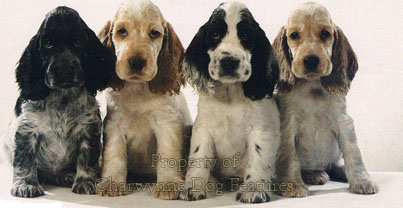
Out of interest, I then went to my local library and a range of newsagents; in a few weeks' worth of publications, I found just in my part of England literally hundreds of pedigree puppies advertised for sale. Of these roughly 98% were registered with the KC. Good news for the Kennel Club's bank balance, not good news for the breeds concerned, bad news for those seeking responsible dog breeding and very bad news indeed for the hard-pressed rescue organisations. In my view, it should not be easy to buy a pedigree puppy, otherwise the purchase is not valued, not made special; degraded in fact.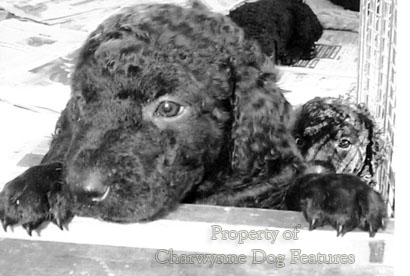
In seeking a couple of unrelated pups, I went to look at several litters and was simply appalled to see the conditions in which they and other adult dogs were kept. If these are the "reputable" breeders we are being urged to deal with, what are the rest like! I have seen far far better conditions when looking at working sheepdog litters, lurcher and working terrier puppies and working gundog stock. One show breeder I visited also ran a boarding kennel and shamelessly admitted that she simply didn't have time to exercise her own dogs. Another show breeder quite brazenly admitted that she had taken a month old litter with her to a distant show "because she couldn't leave them!" These are the people we are being advised to go to above all others.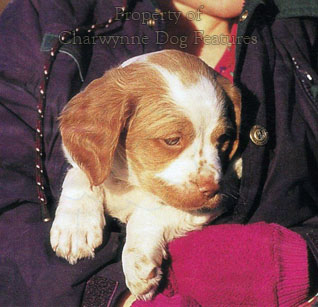
After this experience, I rang six or seven breeders, well known to me but too far away to go to initially, and they expressed no surprise at these events. Is there really no role for a breed club here? Could the Kennel Club be persuaded that pups can only be registered from breeders who are members of a breed club and bound by the code of conduct of that club? Oh, I know that a number of showscene celebrities regularly pour scorn on the very idea of such codes in their weekly columns. But no one in a position to influence should remain in their own small sphere of activity and not keep in touch with the world of dogs away from the show ring. Any step which improves the lot of the domestic dog is always worth serious consideration.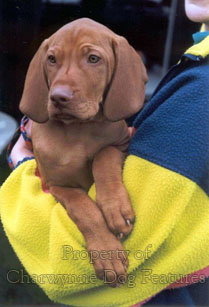
What do breed correspondents have to say about such matters? Here are some of their comments in recent years: Pembrokeshire Welsh corgis -- "...five bitches produced five litters apiece, three of whom had produced their fourth litter less than seven months previously...one was only three years eight months (old). Five litters before her fourth birthday!" Staffordshire bullterriers -- "...12 bitches having had seven litters. 1 had 10 or more litters." Airedale rescue -- "...as fast as one is rehomed others are brought to our attention." Rhodesian ridgebacks -- "The horrific fact is that too many Ridgebacks are being bred." St. Bernards -- "200 Saints had been rehomed since July 1988" i.e. in two years. Dalmatians -- "..one bitch, whelped in 1984 had, by 1989 four litters of 33 puppies." And Weimaraners -- "The number of dogs needing to be rehoused also increases every year."
These words refer to pedigree show dog breeders not puppy farm owners. According to the KC stud books, in the ten years 1981-90, over 58,000 Rottweilers, 188,000 German shepherd dogs and 66,000 Dobermanns were registered. In 1988 alone over 1,600 German shepherd dogs and 680 Dobermanns were received at the Battersea Dogs Home; only 330 were claimed. I dread to think what the totals across the country as a whole were. Breeding on such a scale is completely irresponsible; it is small wonder that we are being advised to go to such breeders, how else can they shift their stock!
What do reports from the magistrates' courts and the KC disciplinary hearings tell us about some of the very people we are being advised to go to for our next pup? Recent cases involve: causing unnecessary cruelty to a bearded collie; wantonly causing suffering to 34 chihuahuas, 2 Chinese crested and a Yorkie; forging hip-scores for a Labrador; causing unnecessary suffering to a Scottish terrier which had been kept in a four feet by two feet enclosure; interfering with a badger sett; breeding and selling dangerous dogs; selling mongrels as GSDs; organising dogfights and assaulting fellow exhibitors.
Or, a cynic might add, are we being advised to go to show breeders such as the one whose poodle gave birth at a show, the one whose dogs died in an overheated car at a show and the ones who have poisoned other exhibits at shows in recent years? Every group of humans contains bad elements but is it responsible advice to tell the public where to go for their next purchase, as the KC do, when you are unwilling to instal any measure of quality control? Instead of an all-embracing wave of approval for all breeder-exhibitors, why not build in some checks and safeguards? Every new owner of a pedigree pup, on paying to register the animal in his or her name, should be given the opportunity to comment on the condition of the breeding establishment and on how the sale was conducted. Even the manufacturer of my car does this! Are cars more important than dogs?
If I were a pedigree dog breeder, knowing the turgid unwillingness of the KC to anticipate need, provide a service for their high fees and be proactive when so many problems in dogs cry out for them to be so, I would be seeking protection from another organisation. I would be looking for something like an Association of Pedigree Dog Breeders, with a firmly worded code of practice embracing conditions of sale (and return), certification of stock and a declaration of intent from the purchaser relating to breeding, export and care. Why should the many excellent breeders be sabotaged by a minority of bad breeders?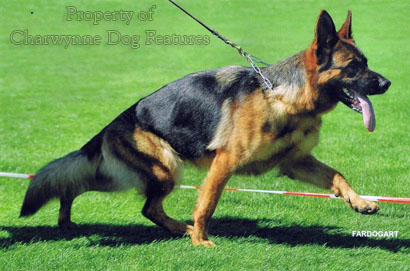
I applaud the action of the breeders of the Cadenham bullmastiffs in publishing their own kennel's code of ethics. This code involves the free replacement of any puppy with a hereditary disabling or temperament defect, not selling any puppy for indiscriminate breeding and never refusing to take back any animal at any age for whatever reason. If only this could be every breeders' mandatory code. Why should one good-hearted breeder have to go it alone when there is a governing body in dogs with immense power from the registration system?
A breeders' register, based on adherence to a strict code, is long overdue. Every buyer of a registered pup or adult dog should have a compulsory written legal agreement supplied as a receipt. This agreement would depend on support from the KC and therefore may be a long time coming (does that body know what an initiative is?). Without such safeguards, scope is being given to the uncaring and the unscrupulous, and the dishonest have a free run. If I were a pedigree dog breeder I would be lobbying hard for such mandatory authorised breeders' agreements. I fear that one day a "Which Magazine" type of investigative report will be undertaken by a consumer protection body into the buying and selling of pedigree dogs and it will be quite devastating. That would damage and be wholly unfair to the truly responsible breeder. But who can define the latter? 
The Kennel Club in recent years has launched what they term a "Puppy Sales Register", with an information pack for prospective puppy owners "where the enquirer is seeking to contact a responsible breeder..." I think they mean any breeder who registers dogs with them -- and we know what some of those are like! What are other countries doing? In Switzerland, a dog cannot be used for breeding unless it passes tests for conformation, temperament and health. In Finland, each breed organisation is required to compile a breeding programme covering character, health, performance and appearance. South Africa has introduced a requirement for hip dysplasia clearance for dogs of all breeds. In Sweden, a litter is registered when the parents meet specified criteria; if they do not, the litter cannot be recognised.
Colombia and Poland accept that mandatory clearances are not popular with breeders but give them no choice. Mexico, Croatia, even El Salvador and the Slovenkia Kennel Club have clearance requirements. The Canadian KC Strategic Planning Committee (does our KC have one?) is looking at the possibility of establishing an advanced registry of pedigree dog breeders. As for us, let's muddle on, producing as many litters as we can, from mediocre unhealthy dogs (how can we tell if they are not?), sometimes in quite dreadful living conditions. We will probably form a committee to ascertain over the next five years or so the precise definition of the word 'responsible'. It's clearly about time someone at our Kennel Club discovered its meaning. We are becoming a 'Third World country' in the breeding of pedigree dogs.